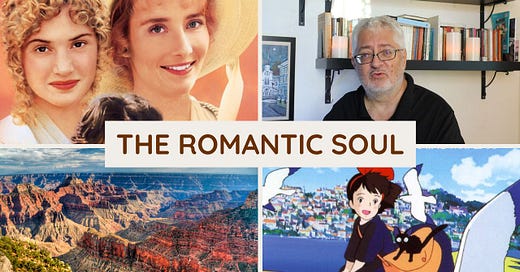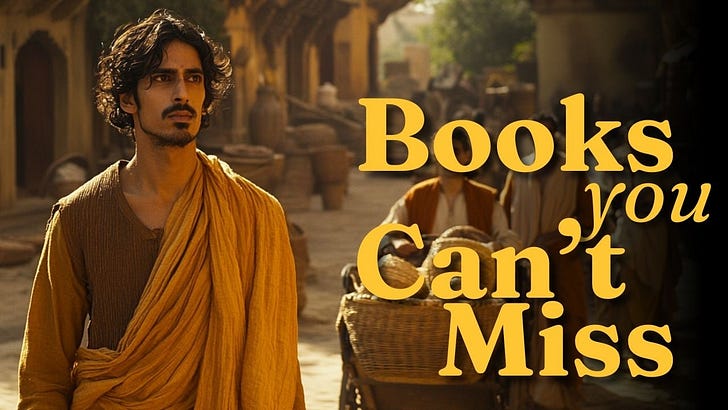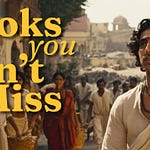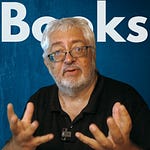Welcome back to Every Dawn and to this new series where I want to present you a book every week! A book that is not just some random bestseller or something that you can find everywhere and that is discussed, you know, all over the internet. But I want specifically to show you books that perhaps you don't know, books that are perhaps a little less known or a little more rare or a little more out of fashion, but that are still great books and that have been very impactful to myself and that I'm carrying around the world with me in my library of 4,000 books. Which perhaps one day I will show you, you know, the books themselves hanging around our home.
Our First Book
The problem is that I am not the type who has, you know, a very nicely organized library. I just managed the shelf to make it look reasonably organized for the video. Otherwise, those 4,000 books are just everywhere in my home, and they are not particularly photogenic. So this is why I won't necessarily make a tour of them now, but anyway, the book I would like to begin with is a book that is very dear to me. It is one of the books that has influenced me hugely my whole life. I have spent it in the light of this book because this book has provided a constant illumination to my own life.
It was like a light source, like a lamp that is there on the one hand to guide me through dark periods of my own life when things were difficult. On the other hand, it has also been a light, you know, in the other metaphor that I could use to understand myself better, to see myself in this light, and to understand what I was doing and why I was doing it.
And also a light to illuminate life in general, what the meaning of life is, and what you know the meaning of life can be for me, the meaning of my life. And all this meaning and illumination and clarity that came out of this book has stayed with me from the first time I read it, which was before I was 18. I am still reading it. It's still always close to me when I go on a holiday. It's always in my backpack as a physical book, and I'm always reading it on flights. I'm always reading it on beaches when whenever it's impractical to carry an electronic book around, and you don't want to be limited by the battery of the book, and so on. And so therefore, I always carry a book, and this is most often the book that I will take because it's also a book that I can reread again and again. I can reread it hundreds of times, which I have done, and I can still enjoy every sentence.
Introducing Herman Hesse
Now, this is a German book. It's a book which perhaps you will not know, or perhaps you will—who knows? It's by a German author, Herman Hesse. Herman Hesse got a Nobel Prize of literature in the 50s, but he was an author who was born at the end of the 19th century, just at the beginning of the 20th, and he died in 1962, I think. I will put his dates here. And he wrote his last books around the 1950s in the middle of the 20th century. So he lived through all the wars of the 20th century. He did not have an easy life like most people of this generation who were involved in all these world wars, but he found strength and inspiration to create some of the most inspiring, uplifting books that have been published ever. I would say some of the most spiritual books also. Hesse was very much interested in Indian spirituality. He traveled to India. He was bitterly disappointed by what he found there because India was not what he had hoped. The India he saw, obviously, was the India of Colonial British India, a country that was poor and where this spirituality that he craved was not really there.
Hesse's Romanticism
Hesse was a romantic. He was a person who made up his own world. He created his own world and he lived in that world, and he tried to share his world with us, his readers. But what he saw in India, you know, the poverty, the colonial administration, the suffering, the dirt, the heat—you know, these were all contrary to his own visions of what romantic India, Buddhist India should be—an enlightened place that was perhaps also, you know, as clean and antiseptic as his own Germany or Switzerland where, for him, in his environment, a very clean, organized life. And then suddenly he was thrown into this chaos of mid-20th-century India, and he was shocked. And he did not like it. So he went back to Switzerland and continued to write his stories.
The Core of Romanticism
In Hesse's work, one thing I already mentioned is the romanticism. So he is a romantic. He's a very classic German romantic in the sense that he wants the world to be in a particular way that excites great emotions in us. This is somehow perhaps one can say the core of the romantic sentiment. You want to have great emotions, and you want these great emotions to be somehow realized not only in your mind, but you want them to be triggered by the greatness of the world, by the way the world is, by the way the universe is, by the greatness of the universe, by the beauty of life, by the staggering variety of creation.
And these were sentiments that were already used in German literature and poetry throughout the 18th and 19th centuries when Goethe and Schiller and, you know, philosophers and writers were writing about and Novalis of course, and Kant, and then you had the Romantic Movement also in England with Lord Byron, for example, or Shelley. And you get an idea for this perhaps you have seen those Ivory Merchant movies about British aristocratic young people going to India or being somewhere, you know, in the UK in the early 20th century in, you know, times where they lived in these beautiful houses with white curtains and so on, and had these strong feelings that you associate with these Byronic characters.
Romanticism in Literature and Life
So this is the kind of the romantic sentiment, sense of sensibility right. For example, this love affair, um, in there these various love affairs, not the restrained ones but the, you know, the silly ones, the ones where you're overcome with emotion, and this overcoming of emotion is even stronger than morality.
This is the core of it that you are not restrained by morality, by rules, by society, but your emotion blows up and is such a fundamental force that the whole world has to, you know, follow your emotion, has to yield to it. And you become, in a sense, this superperson, this Übermensch, which later Nietzsche advocated, and Nietzsche is also in this sense a romantic. The feelings that you have become more important than reality, and somewhere on this path, it leads to craziness, of course, right? It leads to a loss of contact with reality, but it is also a sentiment that is very attractive in a way because instead of being like we are today, these little cogs in the big machine of the world, and we feel that, you know, everything is shrinking.
The Constraints of Modern Life
Our flats are shrinking. I'm living here on 700 square feet with four people in Hong Kong. We don't have so much space, but also cities are growing, and individual space is shrinking, and freedoms are shrinking everywhere. Personal expression is being limited more and more from all sides, and people have to be more predictable and more oiled in a way to fit into this machinery that is built around them. And we don't have so much of an opportunity to be ourselves and to discover ourselves.
And of course, capitalism makes things worse because capitalism demands of us to be consumers that have a uniform taste. We need to consume the same things. We cannot just go off and say, "Now I want to, you know, ride a black horse." You will not find a black horse. There are no black horses anymore, right? Perhaps there are one or two somewhere, but then you first have to apply to the local, you know, school riding school, and then you have to find the horse there, and then it's not your horse. It's a shared horse.
The Loss of Varied Experiences
So we just don't have access to these varied experiences anymore. We can travel, of course, right? But even when we travel, often we will travel with a travel group. We will travel with an agency. We will travel to some kind of organized thing or some organized expeditions or a cruise where everything's pre-organized for you, and you have to just take on your role and do whatever is expected of you instead of being able to be a strong, unique individual, right, with your own perception of the world and your own relation to the universe. And this is what romanticism is about.
The Romanticism of Youth
Hesse very much has this, and of course, this is, if you think of a human life, a trait that we most have in our youth, not in childhood because childhood is normally again very restricted by the parents, by school, by laws, by regulations. But the moment you step over this limit of 18 years of age, which is still a magical limit, you step over that, and then suddenly you are in a world that is full of possibility. All the restrictions are gone. You're not a child anymore. You can do things. You can sign contracts. You can buy. You can sell stuff. You can move out of your parents' house. You can find your own home. You can discover your own city. You can discover your own new friends that are in the same situation as you, and then suddenly you have this explosion of freedom as an 18-year-old who perhaps leaves home in order to study in another city. And this has always been this age of going away and discovering yourself. And this is just the romantic sentiment. This is just the moment that the romantics also idolize—the idea that I go out and I am myself.
The Amish and Romantic Freedom
Only for the romantics, this was a lifelong pursuit. To date, something we accept in 18-year-olds and we give them, you know, a few years to discover this. And this, by the way, is something similar to what the Amish have. They have organized this into an even more traditionally ritualized thing where they have this period where you can escape from all these rules that the Amish society has when you are a particular age. You can go and make experiences and see the world, and then you are supposed to return back to the community and follow the strict rules for the rest of your life. So this is still, you know, somehow warped image of this romantic freedom of youth, of teenage years. And so this is what the romantics wanted only, as I said, you know, as a lifelong pursuit.
Romanticism in Movies and Life
And this is still what we seek in movies, right? When we watch movies about young people or movies that are often, you know, um, animation like these Japanese Ghibli Studio movies like, uh, Kiki, you know, the little witch who goes, and she's 13. So she's not yet at this age where this would be the right age for this romantic explosion of self. She's only 13, but in this movie, she is actually older. I mean, she does things that we would not do at 13 but at 16 or 18. She moves out of her house, and she goes and lives alone and rents a place and so on.
And this period of growing up is this magical period. It has this magical air about it, and perhaps all of us remember it fondly from our own lives, the time when we were 18 or 20 or 22. And then slowly this starts to fade, this romantic sentiment, and it goes and becomes the grown-up world in which then we get a job, and we lose contact with our old friends, and our lives become more regulated. And we have to get up in the morning, and then perhaps a decade later, we have our own family and we have children, and we have to bring them to school, and we have to follow again all these rules that we used to follow when we were in school. Only now we follow them because our children are in school, and we have to live this life with them.
The Stages of Life
And then you reach the stage where the children are gone, then perhaps you have some opportunity, but it's not the same anymore, right? You are weighed down by all these things that society has bestowed upon you in a way, you know, a house, a mortgage, cars, family, uh, still I mean other family. You always have relations around you. You have, uh, still a job. Now you are higher in your job. You have more responsibilities, and with some exceptions, you know, for example, us professors, sometimes have an easier life in this period because we are teaching, we're doing research, we're not so much in this everyday grind, and we are in constant contact with young people which gives us a little bit of a, you know, infusion of youthfulness, like teachers also have it, right? Secondary school teachers are often very cool people because they have this permanent contact with youth which makes them be more youthful themselves.
Old Age and Romanticism
And then, of course, comes old age, which in principle has all the necessary ingredients to be exciting and amazing and romantic, except that now we are too old for it because we are often disillusioned. We are often bodily sick, ill in some way. Some things don't work anymore. You know, we cannot go around and travel the world. We cannot climb mountains.
Some can, and they do. There are many older people who are very active still, but there are also many older people who cannot be because their life just does not allow this anymore. Their bodies do not allow this anymore. And so this is why over the course of a life, we lose this opportunity, you know, more and more to be romantic, to be these romantic heroes that realize this romantic potential that they're supposed to have.
Memories of Romanticism
And this is why in the end, in the memory of most of us, the period that we remember that has these markings of the romantic life is our 18 to 22, 25, you know, phase where we can live this. And then it slowly fades away, and so we always keep a fun memory of this. And often the music we listen to later in life is the music we were listening to at this age, and the ideas, the dreams we have later in life are often related to the ideas and dreams we had in this phase.
And so this stays with us as a memory for the rest of our life. But I think what books can do—now to come back to the books of Hesse—what books can do is that they can give us back this thing. We can live through the book many, many lives, and this is something that has been said before many times, of course. It's nothing original, but it is something that is still very true.
The Power of Books
Books allow us to live a life that is rich with other lives where we take these stories, and if we read the book correctly, we are not just reading the plot. We are taking the stories and making them our own, making them be our own lives. And this is something that you know gets lost when we have these short versions of books. You know, there are all these online reading services where you get, uh, some kind of Cliff Notes, you know, of the book. You get some kind of summary, speed reading. All these things are stupid, I believe, because the point is that the point of a book is that you want to live in this book. If this is a good book, of course, if it's a piece of garbage, if it is some kind of, or you know, it's a, it's a non-fiction book where you want to learn something about, let's say, gardening, and you just want this piece of information. You know, how much fertilizer goes into my tomato? Okay, that's that's another thing. But the books that we live in should be books that we can really live in where we can put our life in and um be there in the word of the book and be lost there. And when you come out on the other end, you have lived an additional life. And this is the greatness of books. This is what is wonderful about them. And this is the way I like to read books, and this is why I don't read many of the books that most people read because I'm not interested in some shallow romances. I want to find a book that is a book that I can live with, that I can live in, and that will give me an additional life.
Conclusion
And with this perhaps I should end for today. Surprisingly, I actually intended this to be the first session where I would talk about an actual book from Hesse. But um, I feel that perhaps it was good to have this little bit of introduction to what this romantic approach to life is, which will help us understand Hesse better. And I will talk next time about Hesse's book, which uh is a great book. It's exactly this kind of book that will give you a new life to live, a life that you have never dreamed of living in, and it's, it's the most exciting, is the greatest book. I, you know, one of the greatest books. Let's be careful that I've ever read, and I think you will enjoy it immensely. And so we will meet again next week and talk about that. Thank you for being here, and see you next time!










Share this post